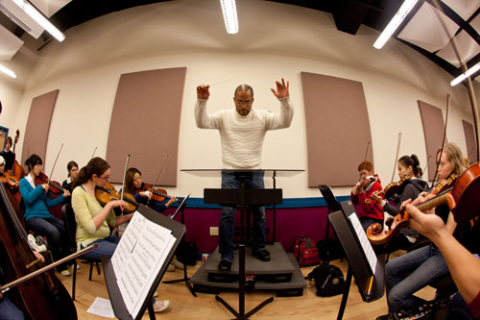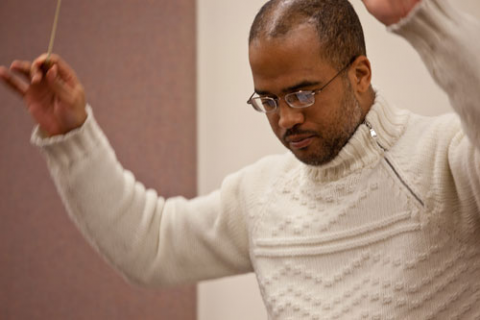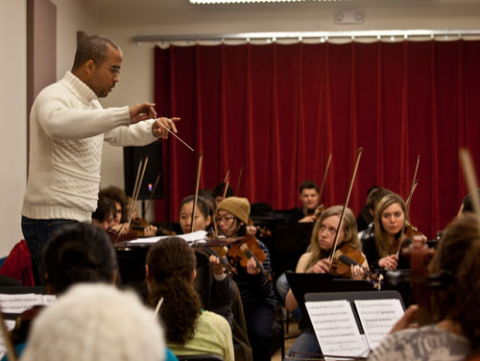Orchestral Improvisation

Daniel Bernard Romain rehearses with the Berklee Contemporary Symphony Orchestra.
Photo by Elisa Rice

DBR's Hip-Hop Essay for Orchestra will be up for improvisation at Sunday's performance.
Photo by Elisa Rice

DBR fuses classical music with hip-hop, funk, and rock.
Photo by Elisa Rice
By design, orchestras follow a plan, performing music predetermined by specific scores and conducted as such. Improvisation doesn't typically enter into the equation, unless you're Daniel Bernard Roumain. The composer/violinist known as DBR has made a mark fusing classical music with hip-hop, funk, and rock and most recently challenged convention when he collaborated with Lady Gaga on American Idol.
Following a year-long artist residency at Berklee, DBR will be leading the 80-piece Berklee Contemporary Symphony Orchestra in an interpretation of his Hip-Hop Essay for Orchestra. The collaboration, set for April 17 at New England Conservatory's Jordan Hall, is apropos to the BCSO's mission, which espouses improvisation as one of its tenets. Directed by assistant professor Francisco Noya, the BCSO's collaboration with DBR came about as a result of String Department chair Melissa Howe's performance with him at a Boston Pops concert in June 2010; she plays violin for the orchestra, and he was the violin soloist on his composition Woodbox Violin Concerto. "I sought him out backstage and when I floated the idea of an improvising symphony orchestra, he began his reply with, 'Well, when I work on improvisation with orchestras . . .' It was clear to me that Daniel was the right person to come to Berklee," says Howe.
The BCSO's free performance will also feature the work of guest artist Patrice Rushen and several award-winning student musicians. The concert is being held thanks to a grant from Katie and Paul Buttenwieser.
Hear DBR talk about his work with the BCSO:
The following is an excerpted conversation with DBR.
What was your inspiration for that piece and why did you select it for this collaboration?
It made the most sense, because it's one of my best orchestral works that incorporates a lot of different hip-hop rhythms. It highlights the orchestra very well; every section is highlighted. It's a concerto for orchestra. The way we're using it, the music itself is flexible and makes for great moments of improvisation that aren't inherent to the score, but we're using it that way.
Melissa Howe was impressed by your response when she asked about improvising with an orchestra. Can you talk about this concept of improvising with classical music, why that's still such a revolutionary idea, and how you see the two fitting together?
I met Melissa when I was working with the Boston Pops. I had performed at Berklee years ago with my own group, but really didn't know anything about the program or know that that was something that Melissa wanted to do as far as this new venture. And you're right, improvisation is not something that an orchestra does naturally. Orchestras by their very definition are about a certain rigidity, playing together and playing in a very formalized way. There's a very simple problem [with the concept]: How do you have 60 or 70 or 80 people improvise together in a meaningful way? It's a major problem. Over the years, I've come up with techniques that solve that problem and that approach the orchestra as a collection of individuals. There's a series of exercises that we've been doing that allow the solving of the problem with the ultimate goal being that the orchestra will improvise a piece with and without a conductor. Hip-Hop Essay, in that sense, is just helping us to achieve that ultimate goal of total, free improvisation.
Can you give an example of one of those exercises?
One of the exercises I do is called one for one. And you can imagine two for two, three for three, four for four. What that means is I have them improvise for one minute and then we do an analysis of what we've played for one minute. Two for two would be we improvise for two minutes and then we talk about it for two minutes. It builds a kind of a muscle memory. You start to realize how long one minute is, or how short, depending. More importantly, something that orchestras generally don't do is talk with one another—it's not a democracy. It can be a wonderful or terrible kind of dictatorship, where one person is really mandating and dictating the ideas, guiding the ideas. Improvisation, of course, is a collection of ideas. You agree. Not only in performance, but also in the process. Those exercises speak directly to [the fact that] it's not just about talking; it's about working as a group. Those exercises—in a really, beautiful, simple, elegant way—speak to not only the process of improvisation but the conversation of improvisation, both musically and literally.
How has it been working with Berklee students, who as contemporary musicians are familiar with the concept of improvisation?
They're much more open, much more flexible. Improvisation is part of their language, part of their rigor, part of their education. That shows. They're really open and wanting to try new things. They're very brave and courageous. The piece we're putting together for the audience really speaks to that. I wanted to show first that the orchestra can really play well, and that they can play my music well. We're using traditional notation; there's no improvisation [in this part]. They're playing an excerpt of Hip-Hop Essay for Orchestra. And then we take that same excerpt and we begin to improvise around it. We use the piece as a point of departure.
Have you used this piece as point of departure before?
I haven't, but this is a yearlong residency, so it made sense for them to really work hard and systematically on the piece. It's been really wonderful. We've had the time now to really grow and expand in what we're doing.
It must be interesting to see your piece evolve, even in the rehearsals.
It's been wonderful. It's one of my favorite pieces, but just as importantly, it's wonderful to see how the musicians change the piece in the improvisations around it.
You've talked about moving classical music to a different place. Is that just a continual process for you?
Yeah, I think there's a lot of room for invention still in classical music. I think that especially orchestral music-making is fairly restrained and limited. Improvisation in this project is just really one way we can start to think about different considerations and different ways of making music.
